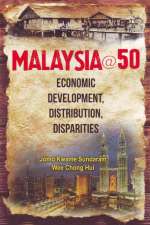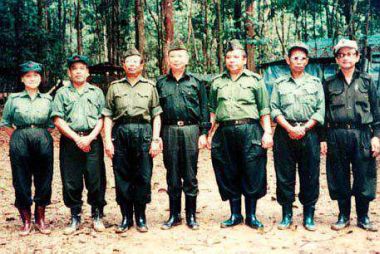COMMENT
The UMNO party elections last weekend and this Saturday will decide the leaders for the country, well at least until GE14. UMNO party elections have traditionally been the venue to set the course for Malaysia's future and the decisions this month are equally significance.
The
two leadership positions - President and Deputy President - have been decided as a result of months of deal-making and accommodation on the part of Prime Minister Najib Razak. He effectively avoided a challenge and sweetened the deal by offering the Bumiputera Economic Empowerment (BEE), an unashamedly UMNO contract-oriented affirmative action policy.
Every other contest - from youth and women's wings to division chiefs -
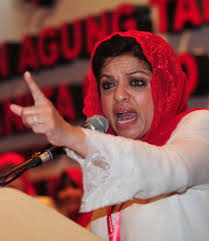
was up for grabs. Last weekend saw the election of Najib's allies to the Wanita, Youth and Puteri wings. These leaders have at best a mixed record in their positions, with leaders such as Shahrizat Abdul Jalil openly tainted.
The
run-up to the polls has been disheartening - full of racial diatribes, policy reversals on issues of reform and void of meaningful engagement with the real issues facing Malaysia. Generous views excuse the actions as electioneering, while those more critical harden their disdain over a party that they perceive has moved from statesmanship to sink-the-ship.
How
can we understand why UMNO is moving in a direction so far away from its statesman history? Will there be any leaders elected that the more than the 30 percent who voted for UMNO respect? Is there any hope of reform from within? What helps us understand the outcome of the elections?
Simplistically, analysts point to the role of Dr Mahathir Mohamad, positioning himself as a behind-the-scenes challenger to Najib. They paint the victories last weekend as wins for Najib and victory of 'liberals', missing many underlying dynamics in the party.
This
election is much more than the product of Najib versus Mahathir as it involves psychology, financial interests and personal ties.
UMNO's reverse psyche
UMNO lives in its own world, a world that is closely knit together in its own fabric and colours. While it co-exists with others, UMNO members (often like the Opposition as well) speak to one another and reinforce their own world view of contemporary Malaysia. They are a family, often tied together with close personal links through marriage and school networks, especially at the elite levels.
There
are now multiple generations of intertwined family networks that play out during the party polls. Elite families have become deeply entrenched across generations. Even as the number of delegates has reached 145,000, the bonds between UMNO members run deep - from the Biro Tatanegara (BTN) training to the shared experiences in a particular UMNO wing and also in business as partners and competitors.
In
this UMNO family dynamic, those who attack its members are the enemy, and those under attack are heroes. The greater the criticism of a particular minister from outside UMNO, the higher the status of the individual within UMNO. This works in reverse to normal logic, where more attacks weakens a candidate.

As criticism is piled on UMNO leaders Ahmad Zahid Hamidi (
right)
and Ali Rustam, for example, their odds to win a vice-presidency have increased. The same could be said for UMNO Youth chief Khairy Jamaluddin, whose criticism in the run-up to polls only boosted his victory.
Those
attacked are the heroes of the party, even when they are acting in manners that most observers would potentially see as illogical, unethical, dangerous and even comical in a tragic sort of way.
The creation of heroes within UMNO reflects the contemporary psyche of the party, which is premised on defending the Malay community from attack. Umno has built its foundation on fear and insecurity in its ranks, especially under the leadership of Mahathir.
Thus it is not a surprise when it acts in such a pattern by stoking fear and harping on the failures of the Malay community. Little has centred on the achievements and the successes of Malays, which deserve attention. Even less has centred on confidence and community among Malays, all elements that should be valued and appreciated.
The forces of negativity overshadow the positive messages in the contemporary UMNO psyche. This negativity is reinforced by the reality that UMNO does not have the support of the majority of Malaysians, its reputation is among the lowest of all the political parties nationally, and despite its efforts in GE13 it did not gain a larger share of the popular vote.
Yet, how they view the last GE is conflicted and also a reverse to general logic. Rather than seeing the weaknesses in support and the lack of legitimacy of their party, UMNO members see GE13 as their victory; they no longer need non-Malay parties to hold power and their share of the seats is larger. Some even go as far to suggest that they have 'bested' the Chinese - characterising this community as the enemy.
These outlooks are rooted in their own UMNO logic, a view of the world that is in denial of the decaying base of support for UMNO and a party in deep trouble. For the UMNO family - all is okay, or at least portrayed as such.
Accommodating 'Sugar Daddy' Najib
The party's outlooks are reinforced by interests. Most people join Umno for the financial benefits of being in the party. This differs from the ideological pull of recruitment of the past. Now even if you are concerned with Malay rights, there are alternatives to joining Umno, such as Perkasa. Umno members go where the money is, and the person who holds the money is the premier.
After pouring out funds pre-GE13, Najib is now perceived himself as the country's biggest 'sugar daddy'. He has openly made it clear that loyalty is expected for rewards to be allocated with slogans such as 'you help me, I help you' and some perceive that he has gone as far as to punish those who do not support him with remarks such as the 'Chinese tsunami.'
If
you want sugar then you are expected to be sweet - or rather sweet to Najib and people who are seen to have his favour. In this case, it is not about 'bees to the honey' but the honey of the BEE.
It
is thus not a surprise that his allies have won so far and are favoured to win in the upcoming Vce-President and Supreme Council elections this weekend. The dynamic is such that UMNO members want the financial rewards. With a big pot of possible contracts on offer, it is not in the interest of those in the system to rock the boat.
What has enhanced the power of Najib and the incumbents in general is the change in the electoral system to more delegates. Judging by the number of complaints from last weekend, money politics continues to be prominent and the advantage lies with the multi-million war chests of the incumbents. Those in the middle or less well-off are being squeezed out in the direct payoffs.
There
is also a more ‘democratising' element in the campaign. In earlier UMNO polls, targeted financial rewards would be primarily spent to woo the chosen delegates. Now money politics has partially moved away from the direct payments to more mass dinners and shared rewards, at least on the part of those who lack the comparative resources to compete with the incumbent war chests.
For many in the contest, especially fresh faces, it is just too expensive to pay off everyone. This has significantly weakened the power of warlords in the party at the state levels and non-incumbent contenders, heightening the position of those already in office, the centre and Najib's influence.
Democratising
the party elections has ironically strengthened the power of the status quo and the existing hierarchy. The end result is that more people circle around the promise of rewards from the centre and those in position, especially the sugar daddy.
Powerful Godfathers
A
third factor involves history and former leaders. While Umno members have a tradition of changing loyalties to accommodate the situation of the present rather than the past, as happened in 1998-99 and is happening now, the past still plays a role in shaping outcomes. Considerable power rests with the godfathers, who mobilise their loyalists and whose members are loyal to them for putting them into positions of power.

Mahathir is the ever powerful don, who has branded the party in his racial
outlook and legacy of money politics. In every state, he effectively played divide and rule to maintain his position. Yet, his direct hold on the party has waned with 10 years out of office and the slow regeneration that is happening within Umno.
Despite his stature, Mahathir was clearly the loser in last weekend's results. He tapped into an old family battle between Sanusi Junid and Abdullah Ahmad Badawi in backing the challenger to Abdullah's son-in-law Khairy, Akhramsyah Sanusi, who was soundly defeated.
Another possible loss is also on the cards. His son appears not to even have the support of a majority of delegates in his own state of Kedah, as many see Mukhriz Mahathir's rise as premature and view his record in the party not in fitting with the credentials of a vice-presidency as he has not served in senior party leadership positions or government before GE13.
The
campaign is still ongoing and tight UMNO polls such as the VP race usually come down to the last 24 hours, and to the flow of ringgit noted above. Mahathir will have to play his last cards to secure his son in power, or face the reality of his declining influence. Ironically, Mahathir faces the challenge of the legacy he left behind - money politics.
Many analysts do not appreciate the role of another don, Abdullah Badawi. A large share of the current delegates are more beholden to Abdullah rather than Mahathir himself. Even as Abdullah's reputation within UMNO is mixed, with him receiving much of the blame for the loss of the party's position and the 2008 election results, those in the leadership positions remain quietly loyal to Abdullah. They remember who ousted whom from office.
Najib's
success can be seen as a product of the decision to ally with Abdullah's people in his cabinet selection and in the run-up to the party polls. The reality is that the Abdullah factor weakens those seen as close to Mahathir and his allies. This Najib-Abdullah alliance is targeted to offset any possible challenge to the existing leadership and consolidate Najib's position within the party.
Its the status quo
The
outcome in UMNO polls has to be understood within these lens of the party reverse psychology, financial interests and allies with powerful ever-present godfathers of the past.
The
end result, however, is that UMNO does not necessarily produce the caliber of leadership that Malaysians deserve, as the sources for new blood, outside of the elite and favoured allies, is minimal. The status quo appears to be reigning.
Sadly, concerns about character and corruption persist. Any belief that reform from within the party is evaporating, if it is even being considered at all. Additional democratising measures within the party polls have not to date transformed the leadership slate, but consolidated those in power.
The younger generation within UMNO is being encouraged to accept the standard rules of the game rather than reform them. It is important to appreciate that none of the major contenders for senior positions within Umno is projecting a genuine message of reform or engaging in a practice of reform, as seen with the persistent issues of money
While the results of the key competitive races will come in next week, the lessons from the UMNO polls so far is that dysfunctionality is now the norm, as the interests of family have been imposed on the country.

DR BRIDGET WELSH is Associate Professor of Political Science at Singapore Management University. Bridget can be reached at bwelsh@smu.edu.sg.
 Muslim groups outside the court building Putrajaya today. The Malaysian Insider pic by Nazir Sufari, October 14, 2013.So the Court of Appeal has ruled that the Catholic Church cannot use the word Allah in its weekly publication, Herald. Understandably, there is widespread disappointment, even anger among Christians, especially those in East Malaysia who have used Allah in Christian prayers and worship services for more than 100 years. Yes, far longer than the birth of this nation or for that matter, the age of the chief protagonist, Umno.
Muslim groups outside the court building Putrajaya today. The Malaysian Insider pic by Nazir Sufari, October 14, 2013.So the Court of Appeal has ruled that the Catholic Church cannot use the word Allah in its weekly publication, Herald. Understandably, there is widespread disappointment, even anger among Christians, especially those in East Malaysia who have used Allah in Christian prayers and worship services for more than 100 years. Yes, far longer than the birth of this nation or for that matter, the age of the chief protagonist, Umno.



 As criticism is piled on UMNO leaders Ahmad Zahid Hamidi (right)
and Ali Rustam, for example, their odds to win a vice-presidency have increased. The same could be said for UMNO Youth chief Khairy Jamaluddin, whose criticism in the run-up to polls only boosted his victory.
As criticism is piled on UMNO leaders Ahmad Zahid Hamidi (right)
and Ali Rustam, for example, their odds to win a vice-presidency have increased. The same could be said for UMNO Youth chief Khairy Jamaluddin, whose criticism in the run-up to polls only boosted his victory. Mahathir is the ever powerful don, who has branded the party in his racial
outlook and legacy of money politics. In every state, he effectively played divide and rule to maintain his position. Yet, his direct hold on the party has waned with 10 years out of office and the slow regeneration that is happening within Umno.
Mahathir is the ever powerful don, who has branded the party in his racial
outlook and legacy of money politics. In every state, he effectively played divide and rule to maintain his position. Yet, his direct hold on the party has waned with 10 years out of office and the slow regeneration that is happening within Umno.
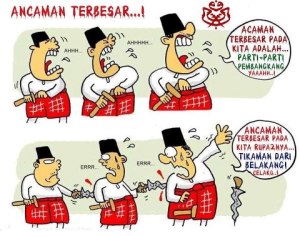
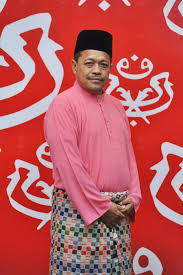
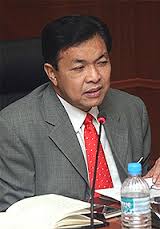

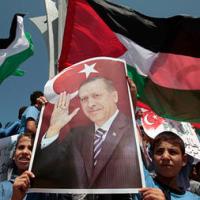
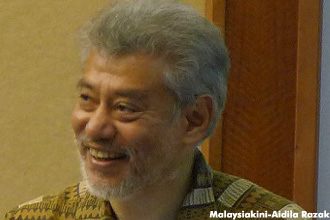
 Malaysia's
rapid growth from 1985 to 1995 was less about good policy and more
because the US dollar significantly depreciated against the Japanese
Yen, he added.
Malaysia's
rapid growth from 1985 to 1995 was less about good policy and more
because the US dollar significantly depreciated against the Japanese
Yen, he added.